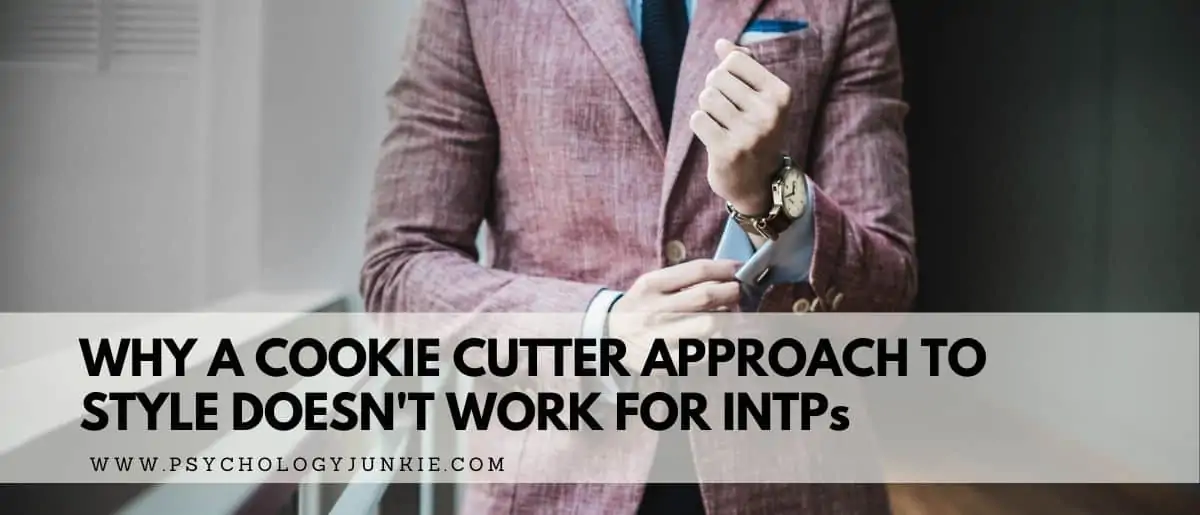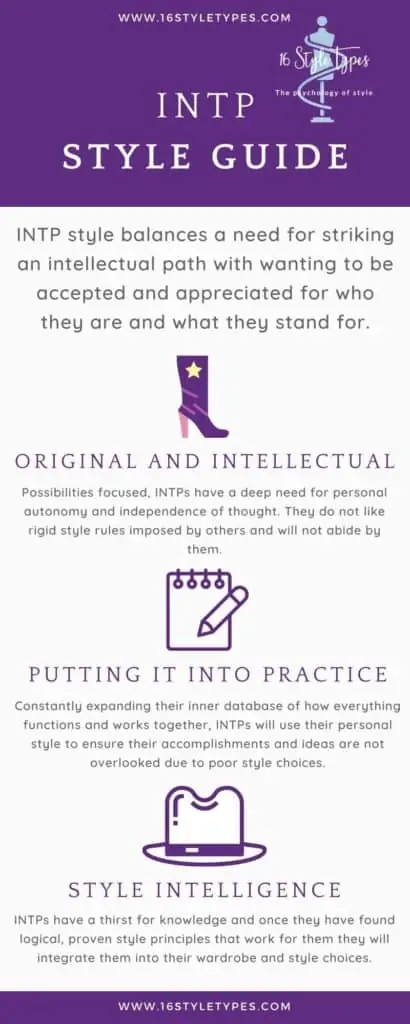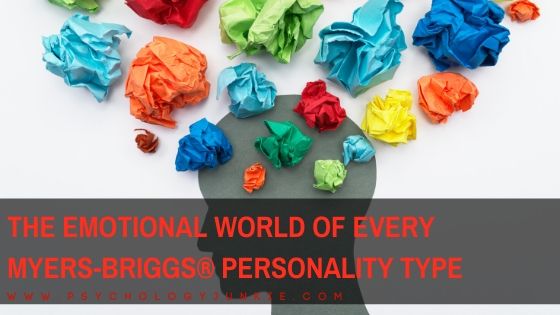Why a Cookie Cutter Approach to Style Doesn’t Work for INTPs
Can style be learned, or do you have to be born with it to have any chance of becoming stylish? Style is deeply, deeply personal, and depending on which of the 16 Myers-Briggs personality types you prefer, you’ll approach it quite uniquely.
INTPs enjoy contemplating ideas and theories that few other people think about and are often extremely focused on them. Excellent at analyzing, categorizing, and theorizing, INTPs can imagine a future that may seem at odds with the practical reality around them. Competence and independent thought are driving needs for INTPs who often defy conventional categorization.

And just as INTPs think unconventionally, their style choices can be unconventional as well.
Estimated reading time: 5 minutes
Original and Intellectual
Complex and unconventional thinkers, INTPs revel in gathering knowledge, innovating, and experimenting. Possibilities focused, INTPs have a deep need for personal autonomy and independence. They do not like rigid rules and often do not abide by them.
Don’t TELL me what to do (or wear.) Explain why if you want my cooperation!
With their unconventional approach to many things in life, the INTP style essence balances a need for original thinking and striking an independent path, with wanting to be accepted and appreciated for who they are, what they stand for, and how they go about life.
I don’t think of style as stylish. Stylish may be trendy, or what a population considers appropriate. Style is a look, a feel, it’s a way of expressing who you are.
The stylish INTP won’t subscribe to other people’s ideas or expectations. In fact, copying someone else’s style creates a sense of unease at being an imposter for the INTP. Getting input from others whose style they admire is great information but in the end, it’s simply data. It’s paramount that there’s space to make their own decisions in their own time and allow their abstract intellectual thinking to analyze and apply logical principles to their personal style.
Putting It into Practice
INTPs have a thirst for knowledge and are constantly expanding their inner database of how everything functions and works together. However, they are often content to observe without participating so INTPs can often come across as disinterested in their style choices. They are unlikely to notice the style of others so, in turn, they may not realize that they are being judged on their own style choices. The thought of being overlooked or not taken as seriously as their accomplishments warrant because their style is letting them down can be difficult to accept. Style, to the INTP, is often seen as shallow and unimportant, so being judged by appearances is disconcerting and insulting to them. That said, once the INTP is on board with the idea that their image has an impact on how they are perceived and must be addressed, they will want to be competent at it at whatever level they choose.
People commenting on my style can be helpful, it can open options for me. I learned that people judge you on how you dress. It’s a statement. Clothes have to express something about my personality otherwise it feels like I’m canceling who I am.
INTPs hold themselves to very high internal standards and when they embrace the impact of their image, they will spend a lot of time considering different scenarios and their complementary outfits.
I’m most unhappy with my outfit choices when I’ve made some huge mistake as to being appropriate or flattering.
Style Intelligence
Striving for excellence in many things but particularly in the quality of their thinking and analysis, INTPs often expend a lot of brainpower and time collecting, dissecting, and categorizing information and ideas. Applied to style, this can manifest in the INTP wanting to understand the framework underpinning any logical style system; once it passes muster, they’ll happily adopt the style principles set forth, and possibly enjoy it a great deal.
I hate being told what to do about my outfits. Suggestions are a better way to phrase critiques.
Skilled at noticing distinctions in things that others may blur together, INTPs can place a categorization system onto almost anything. When directed at style, the stylish INTP adopts a proven style system, possibly quite an intricate and involved one, based on a logical framework, that works perfectly for them. No guessing required.
My most stylish self would be thinking about all sorts of things, but not clothes, style, or fashion. She would not need to think much about style because she would have mastered all the relevant theories and integrated those theories into practice.
Many INTPs report that finding a set of style principles they like, trust, and can rely upon helps them define and express their style.

Other Articles You Might Enjoy:
Complex, Inquisitive, Clever: The INTP Style Pathway
The Style Strategist – Intuition and Thinking (NT) Super Style
Why Style is Not Shallow or Only Skin Deep
Is that Outfit Feedback Hard Data or Just an Opinion?
Why You Should Be Authentic in Your Dress
Expressing Your Style, Your Way
How to Build Your Style Muscles and Become More Stylish
About the Authors:

Imogen Lamport and Jill Chivers, together with Jane Kise, are co-founders of 16 Style Types – the combining of the 16 psychological types with concepts of authentic style. 16 Style Types is a world-class world-first approach that draws out the essence of a person’s sty
Subscribe to Our Newsletter

Want to discover more about personality type? Get the inside scoop with Susan Storm on all things typological, along with special subscriber freebies, and discounts on new eBooks and courses! Join our newsletter today!










